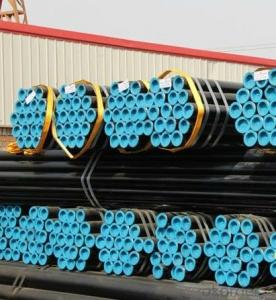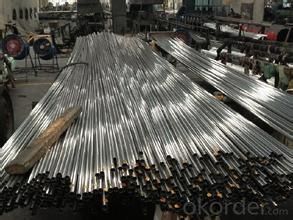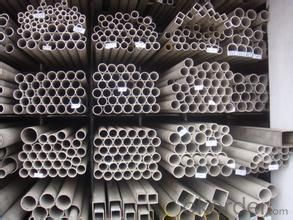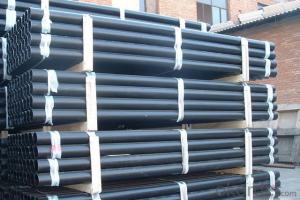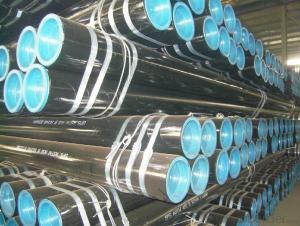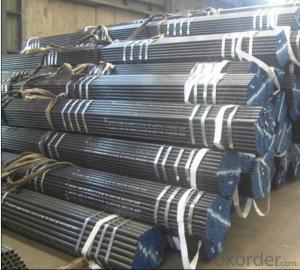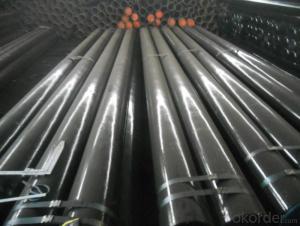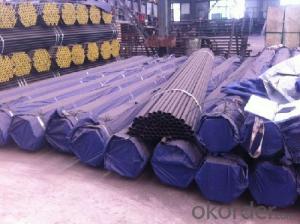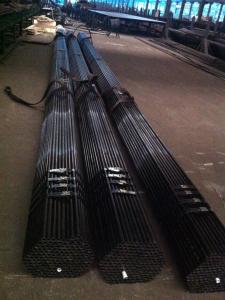ASTM A106B Seamless Steel Pipe
- Loading Port:
- China Main Port
- Payment Terms:
- TT or LC
- Min Order Qty:
- -
- Supply Capability:
- -
OKorder Service Pledge
OKorder Financial Service
You Might Also Like
Quick Details
| Thickness: | 4 - 100 mm | Section Shape: | Round | Outer Diameter: | 27 - 508 mm |
| Place of Origin: | Shandong China (Mainland) | Secondary Or Not: | Non-secondary | Application: | Structure Pipe |
| Technique: | Hot Rolled | Certification: | API | Surface Treatment: | Black painted or oiled |
| Special Pipe: | Thick Wall Pipe | Alloy Or Not: | Non-alloy | ||
| OD: | 1/2"-22" | Length: | 5-12m | Certificates: | ISO&API |
| Grade: | 20#,16Mn,A53(A,B),A106(B,C),St37,St52,St42,St35.8,10#-45#,A53-A369,ST35-ST52 | Standard: | GB/T 8162-1999,DIN 1629/3,ASTM A106-2006,GB,DIN,ASTM |
Packaging & Delivery
| Packaging Detail: | wrapped in bundles with steel strips |
| Delivery Detail: | 30days |
Specifications
1, We manufacture steel pipes
2, Main market: Asia, South America
3, Advantage: Medium and Thick wall pipe
4, High quaility
ASTM A106B Seamless Steel Pipe Image
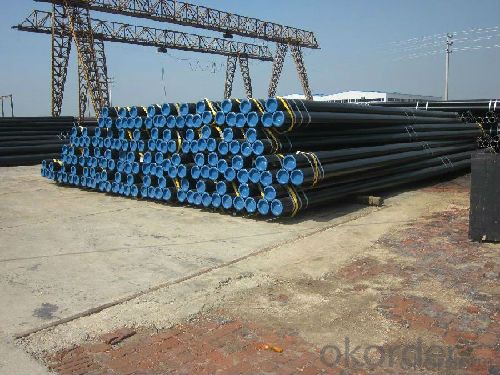
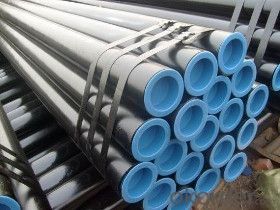
FAQ of ASTM A106B Seamless Steel Pipe
①How is the quality of your products?
Our products are manufactured strictly according to national and internaional standard, and we take a test
on every pipe before delivered out. If you want see our quality certifications and all kinds of testing report, please just ask us for it.
Guaranteed: If products’ quality don’t accord to discription as we give or the promise before you place order, we promise 100% refund.
②How about price?
Yes, we are factory and be able to give you lowest price below market one, and we have a policy that “ for saving time and absolutely honest business attitude, we quote as lowest as possible for any customer, and discount can be given according to quantity”,if you like bargain and factory price is not low enough as you think, just don’t waste your time.Please trust the quotation we would give you, it is professional one.
③Why should you chose us?
Chose happens because of quality, then price, We can give you both.Additionally, we can also offer professional products inquiry, products knowledge train(for agents), smooth goods delivery, exellent customer solution proposals.Our service formula: good quality+good price+good service=customer’s trust
SGS test is available, customer inspection before shipping is welcome, third party inspection is no problem.
Any question, pls feel free to contact us !
- Q: How do you solder purple copper plate and steel tube?
- When the copper pipe and the size is not too large, such as 10 mm below the pipe welding, brazing is suggested, with brass solder, such as Wei Odin 201 solder, with supporting solder paste, with a neutral flame welding, the copper plate is heated to about 800 degrees, and then use the solder with 201 Wei Odin 201-F in solder welding, welding wire with melt molding.
- Q: What are the advantages of using steel pipes in the mining industry?
- There are several advantages of using steel pipes in the mining industry. Firstly, steel pipes are extremely durable and can withstand high-pressure environments, making them ideal for transporting materials such as water, slurry, and chemicals in mining operations. Secondly, steel pipes are resistant to corrosion, which is crucial in the mining industry where materials are often exposed to harsh conditions and abrasive substances. Additionally, steel pipes have a high heat tolerance, allowing them to handle hot materials without deformation or damage. Lastly, steel pipes are easy to install and maintain, reducing downtime and ensuring smooth operations in the mining industry.
- Q: What is the maximum temperature and pressure that steel pipes can withstand?
- The maximum temperature and pressure that steel pipes can withstand depend on various factors such as the grade of steel, wall thickness, and intended application. However, in general, steel pipes can typically withstand temperatures up to 1000-1200°C (1800-2200°F) and pressures ranging from 1000-5000 psi (6.9-34.5 MPa). It is important to consult specific industry standards and engineering guidelines for accurate information based on the specific steel grade and application.
- Q: What is galvanized steel pipe?
- Galvanized steel pipe is a type of steel pipe that has been coated with a layer of zinc to protect it from corrosion. This process involves immersing the steel pipe in a molten zinc bath, which creates a protective barrier on the surface of the pipe. The zinc coating helps to prolong the lifespan of the steel pipe, making it resistant to rust and other forms of corrosion. Galvanized steel pipes are commonly used in plumbing, water supply, and construction applications.
- Q: What quota should be installed for heating seamless steel pipe?
- Seamless steel pipe having a hollow cross section, used as a conduit for conveying fluids, such as pipelines for transporting petroleum, natural gas, gas, water, and certain solid materials.
- Q: Can steel pipes be used for wastewater treatment facilities?
- Yes, steel pipes can be used for wastewater treatment facilities. Steel pipes are commonly used in wastewater treatment plants due to their durability, strength, and resistance to corrosion. They can efficiently transport and distribute wastewater throughout the facility, ensuring its proper treatment and disposal. Additionally, steel pipes can withstand the harsh conditions and chemicals often present in wastewater treatment processes, making them a reliable choice for this application.
- Q: Can steel pipes be used for conveying gases?
- Yes, steel pipes can be used for conveying gases. Steel pipes are widely used in industrial applications for transporting various gases, including natural gas, propane, and other types of gases. Steel pipes have excellent strength and durability, making them suitable for carrying gases at high pressures and temperatures. Additionally, steel pipes have a high resistance to corrosion, which is crucial when dealing with gases that can be corrosive.
- Q: Can steel pipes be used for petrochemical plants?
- Yes, steel pipes can be used for petrochemical plants. Steel pipes are often preferred in petrochemical plants due to their high strength, durability, and resistance to corrosion, making them ideal for handling various chemicals and substances involved in petrochemical processes. Additionally, steel pipes can withstand high pressure and temperature conditions commonly encountered in petrochemical plants, making them a reliable choice for transporting fluids and gases.
- Q: Is the diameter of the steel tube indicated by the outer diameter by the wall thickness or by the inside diameter by the wall thickness?
- 1, DN refers to the nominal diameter of the pipe, the outer diameter and diameter of the average. The value of DN, the value of =De, the thickness of -0.5* tube wall. Note: This is neither outer diameter nor inner diameter. Water and gas transmission pipe (galvanized steel pipe or non galvanized steel pipe), cast iron pipe, steel plastic composite pipe and polyvinyl chloride (PVC) pipe, etc., shall be marked with nominal diameter "DN" (such as DN15, DN50).2, De mainly refers to the pipe diameter, PPR, PE, PP pipe diameter, generally use the De label, are marked as outer diameter and thickness of the form, De25 * 3.3 and D generally refer to the inner diameter of the pipe.4, d concrete pipe diameter. Reinforced concrete (or concrete) pipe, clay pipe, acid resistant ceramic tube, pipe and other pipe diameter gangwa, should be said with inner diameter of D (such as D230, D380 etc.)5, Phi represents the diameter of the ordinary circle. It can also indicate the outer diameter of the pipe, but it should be multiplied by the wall thickness at this time. Such as: Phi 25 x 3, indicating outer diameter 25mm, wall thickness of 3mm pipe.
- Q: Can steel pipes be used for fencing?
- Yes, steel pipes can be used for fencing. They are strong, durable, and provide excellent security. Steel pipes are commonly used in industrial and commercial settings, as well as for agricultural purposes. They can be easily welded and can withstand harsh weather conditions, making them an ideal material for fencing.
Send your message to us
ASTM A106B Seamless Steel Pipe
- Loading Port:
- China Main Port
- Payment Terms:
- TT or LC
- Min Order Qty:
- -
- Supply Capability:
- -
OKorder Service Pledge
OKorder Financial Service
Similar products
Hot products
Hot Searches
Related keywords
